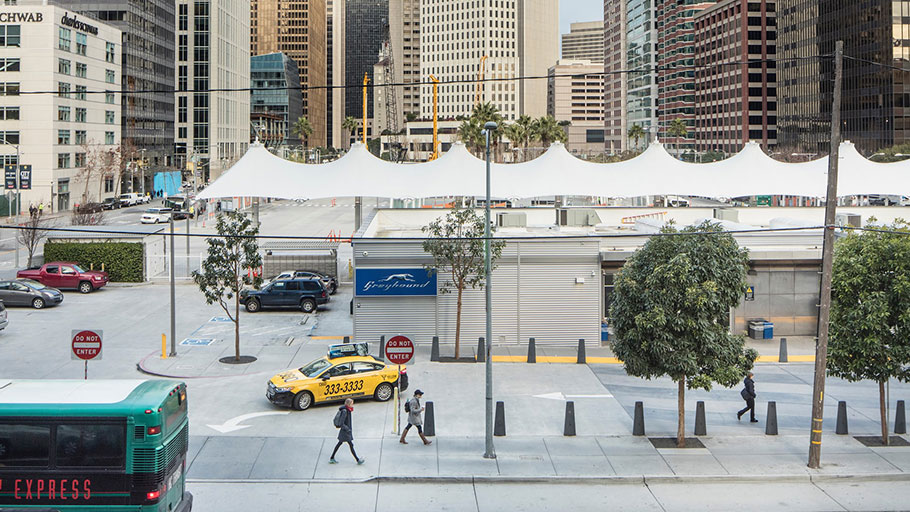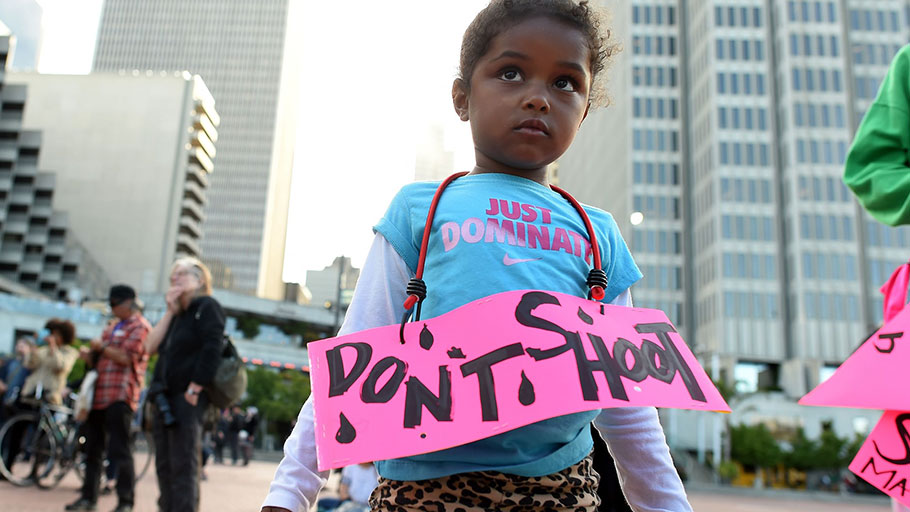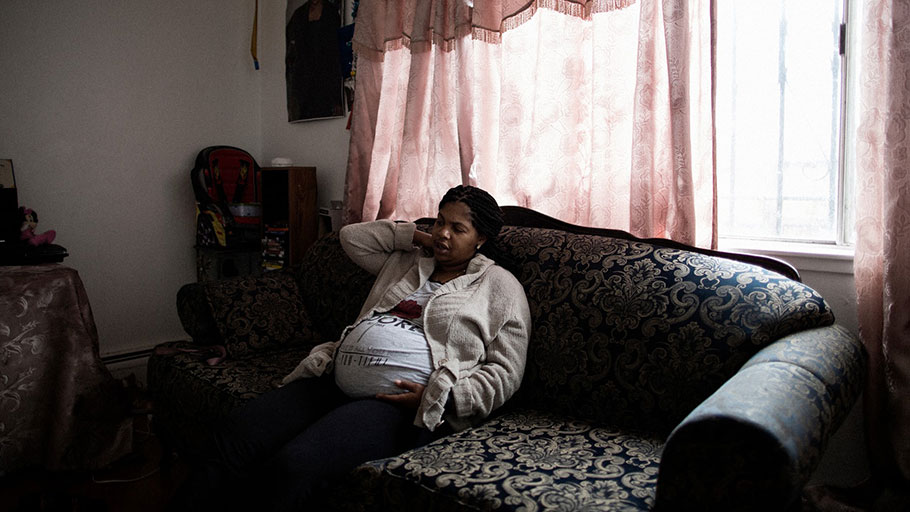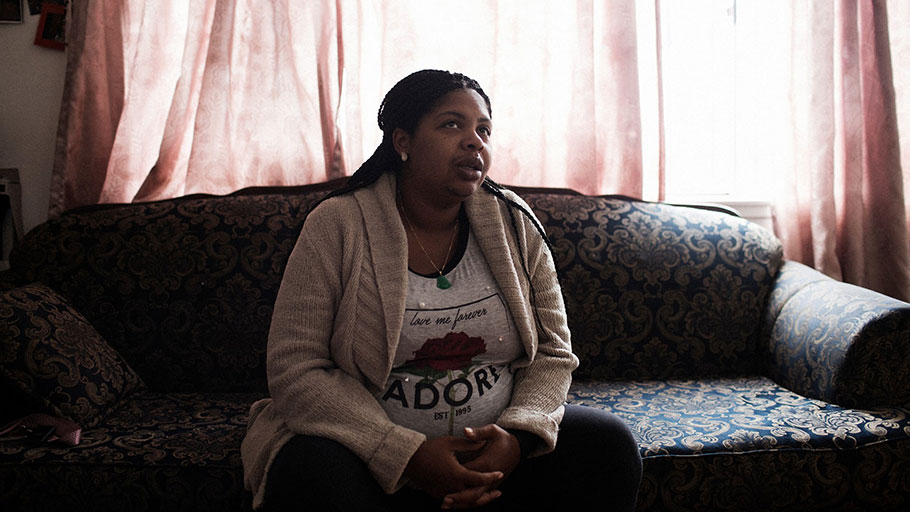Jasmine Ball, 33, lost her twin daughters who were born prematurely. Photograph: Talia Herman for the Guardian
In one of the wealthiest US cities, the racial disparity in birth outcomes is stark: ‘Why isn’t this sounding a bigger alarm?’
By Leslie Casimir, The Guardian —
Jasmine Ball was barely five months pregnant with twins when the labor pains jolted through her lower body.
Rushed to the hospital, the doctors told her that her cervix had dilated completely. There was nothing they could do to stop the babies from coming.
“I didn’t know what was going on,” said Ball, a San Francisco native. “I was in shock.”
Weighing 1lb each, Da’Mya was born first and survived for one hour. Ja’Mya was a stillborn.
“Da’Mya was just waiting for her little sister to come out before she died,” said Ball, who was 20 at the time.
Her nightmare didn’t stop there. As she held her daughters’ bodies in her arms, a white man entered the delivery room. He could have been a pediatrician or a grief counselor – Ball isn’t sure because he never introduced himself.
“He said to me ‘But you’re really young, you can have more kids,’” said Ball. “Like I had just lost an object that can be easily replaced. Who says that to someone?”
Stunned, Ball tried to forget his flip comment. She baptized her girls and buried them. She couldn’t find burial clothes that properly fit so she draped the smallest of white dresses on their tiny bodies after they were laid in their caskets.
“I told myself that I was going to be fine – it wasn’t going to be a big deal, that I would be able to deal with it,” she said.
“But that wasn’t the case,” said Ball, who is now 33. Instead she self-medicated herself by smoking marijuana and barricaded herself in her mother’s home in San Francisco.
“It took me 10 years to not be depressed about it.”
Among the city’s African American residents, already grappling with a declining population, high unemployment and housing costs, there is another unrelenting crisis: black babies and mothers are dying at a disproportionate rate.
Nationally, African American babies are more than twice as likely to die as whites. And their mothers are three to four times as likely to die from childbirth complications as white women, according to 2016 data from the US Centers for Disease Control.

In San Francisco, the median income for black residents is $27,000. For whites it is $89,000. Photograph: David Levene for the Guardian
But in San Francisco, one of the wealthiest cities in the nation that boasts some of the most innovative approaches in healthcare, the rates of bad birth outcomes stand out even from the national figures.
Between 2012 and 2014, the San Francisco department of public health noted that black infants here died at a rate of 9.6 per 1,000 births, a stark difference from the caucasian rate of 2.1 deaths. Although blacks make up only 5% of all births in the city, 23% of all infant deaths were African American infants, according to the most recent city data. In addition, of the 10 documented maternal deaths in recent years, five were black mothers. Yet African Americans make up about only 6% of the city’s population.
“When you first hear the numbers, you become shocked and incredibly disheartened,” said Dr Andrea Jackson, an assistant professor of obstetrics and gynecology at the University of California, San Francisco, who will start a new group prenatal care program solely for black women in the fall.
“Why isn’t this sounding a bigger alarm?”
‘Toxic stress impacts birth’
For years, researchers have asked that very same question. Health experts cannot fully explain why African American women and babies are dying more than any other group. Having pre-existing conditions such as diabetes or high blood pressure can cause some of these bad birth outcomes. But research shows that even healthy, and highly educated, black women have shared the same fate.
Serena Williams highlighted the issue this year, when she revealed that she almost died after giving birth to her daughter. The tennis great wrote in a CNN opinion piece and described in an interview to Vogue about how she had to advocate for herself when hospital staff were slow to respond to her concerns that she was experiencing a pulmonary embolism – blood clots in her lungs. A nurse thought her pain medication was making her confused, but Williams, who has a history of blood clots, repeatedly insisted on a CT scan, which confirmed several blood clots forming in her chest.
“Doctors aren’t listening to us, quite frankly,” Williams, who lives part of the time in San Francisco, told the BBC, adding: “I think there’s a lot of prejudging, absolutely, that definitely goes on. And it needs to be spoken about, it needs to be addressed.”
Experts now agree that racial discrimination is the main culprit for these bad birth outcomes. In addition to prejudices – unconscious and not – in the delivery rooms, long-term stress brought on by America’s ugly racial history, they say, is killing babies and mothers. In other words, the legacy of segregated neighborhoods, inadequate schools, mass incarceration, police brutality, to name a few, are weathering the bodies of black women.

A Black Lives Matter rally in San Francisco. Photograph: Josh Edelson/AFP/Getty Images
“Lifelong experiences of racial discrimination and the policies that created inequitable neighborhoods and socioeconomic conditions are causing the toxic stress that impacts birth and infant health,” said Dr Curtis Chan, who is the medical director of maternal, child and adolescent health at the city’s health department.
Constant stress on the body weakens the immune system, causing what doctors describe as an allostatic load that makes the body ripe for a number of health problems – from high blood pressure to heart disease.
In San Francisco, the scars left behind by racism are remarkable. In the 1964 documentary, Take This Hammer, the renowned author and activist James Baldwin says: “There is no distance between the facts of life in San Francisco and the facts of life in Birmingham [Alabama].”
The only difference, he adds, is that segregation never was acknowledged here, just swept under the rug.
Once a hub for African American culture in the west, San Francisco’s black community has since been gutted of its people. In 1970, there were more than 96,000 black residents. By 2016, the population had shrunk to 43,000 with most living in public housing.
Now, because of segregation, the majority of blacks reside in two pockets in the city, one of which houses a former naval shipyard cum toxic waste site. The black student achievement gap remains the largest in the state. And as booming tech companies like Facebook, Twitter and Salesforce employ thousands in the city, the median income for black residents is $27,000, while whites make $89,000. The disparity is double the national average.
San Francisco was built on the backs of people who didn’t have much. Now they don’t want those type of people here — Jasmine Ball
“San Francisco is like ‘Nicety’ – nice outwardly but inwardly nasty,” explained Joi Jackson-Morgan, the executive director of the 3rd Street Youth Center and Clinic in Bayview-Hunters Point, the city’s predominantly black neighborhood. “We’re over-policed, we don’t have access to proper nutrition, we’re stressed out because of displacement, and a lack of opportunities.”
Linda Jones, an Oakland-based doula and co-founder of Black Women Birthing Justice, sees where this leads in the delivery room. In December, Jones’s group published Battling Over Birth: Black Women and the Maternal Health Care Crisis, a book based on 100 interviews with black women on their childbirth experiences. Many of the women’s stories, Jones said, were traumatic and dehumanizing. Women described being ignored or disrespected by hospital staff. One mother, named Zanthia, said she was hit by a nurse after she refused to stop pushing while nurses fetched a doctor.
“It doesn’t matter what your strata in life is, as long as you’re black you’re treated the same way,” she said.
Jones said there had been little urgency to the issue of black maternal and infant mortality in the city – unlike the battle against the Aids epidemic in the 1980s when affluent white men were dying.
“The Black Lives Matter campaign came about because young black men are getting killed by the police,” Jones said. “But we feel the same thing is happening to black women and their children during childbirth.”
Tackling unconscious bias
In recent years, officials in the city have been rolling out a number of initiatives to tackle the problem.
Dr Malini Nijagal, an OB-GYN at Zuckerberg San Francisco general hospital, who is spearheading an effort to redesign prenatal care for publicly-insured women in San Francisco, said that in the last year she and her counterparts have been forced to reckon with their own unexamined biases.
“The classic that we often face is on the labor and delivery unit, this question about whether we should do drug testing [on a patient] or not,” she said. “It is very likely that in the past, I have kind of used my own biases to decide who I think may need drug testing.”
At UCSF, researchers are studying how stress can increase pregnancy risks, including the development of a new blood test that can detect who is at risk for pre-term birth, the main cause of infant death, and adjust a woman’s prenatal care for early clinical intervention.
Also, a collective of agencies and community members are pushing to provide black women access to doula care and stable housing, both of which come at a premium cost.
“We have all bought into this mythology around our progressive values so completely that it’s surprising to us that these bad birth outcomes could happen under our watch,” said Dr Zea Malawa, a city health department pediatrician, who is spearheading the new San Francisco pre-term birth collective impact initiative.

Jasmine Ball at her mother’s home in Bayview-Hunters Point. Photograph: Talia Herman for the Guardian
The city’s push to combat these bad birth outcomes could not come soon enough, say participants at the Black Infant Health center, a city-funded support group for pregnant black women.
Every week, about a dozen moms meet in a room filled with photos of black mothers and their babies to commiserate about navigating life in San Francisco.
During the 10-week sessions, they are offered a vegetable and fruit-heavy meal and are led in breathing meditations to visualize a better life for themselves and for their unborn babies. They learn about what to expect at the hospital and how to advocate for themselves.
It doesn’t matter what your strata in life is, as long as you’re black you’re treated the same way — Linda Jones
“Personal power really begins with care of the self,” reads a bell hooks quote hanging on the wall.
“We show them that we appreciate them because they may not get that anywhere else they go,” said Felicha Bell, a public health nurse who recruits and counsels the mothers.
During a recent spring session, there were women like Aukemi Hare, 20, a part-time administrative assistant to a hand surgeon, and Jasmine Ball, who works as a soul food caterer.
Hare, who is expecting a boy on 17 July, has been on her own since the age of 16 and has lived in a myriad of foster homes and shelters. She was abandoned by her abusive mother and has worked a patchwork of jobs since finishing high school.
“Basically, I should be graduating from college this year,” Hare said. “But I need money. I need to work now.”
Currently living in transitional housing in the Mission neighborhood, she has been applying for subsidized apartments throughout the city. With an annual salary of $15,000, she also is scrambling to secure childcare. She will need to return to work six weeks after her son, Percy, is born.
After the loss of her twins more than a decade ago, Ball gave birth to a baby girl, Laila, on 20 May. Ball was raised by her mother, while her father, who suffered from a drug addiction, was in prison for most of her youth. She and her four siblings shared their two-bedroom house with three cousins because her mother’s sister also had a drug addiction.
“San Francisco was built on the backs of people who didn’t have much,” Ball said. “But now they don’t want those type of people here any more.”
Jackson, the UCSF OB-GYN, who is black, knows these stories all too well. When she gave birth to her first child in February, she was so worried about encountering unconscious biases from nurses and doctors that she allowed only her trusted colleagues to deliver her baby girl, Laura. After the pregnancy, she developed pre-eclampsia, a potentially dangerous complication of elevated high blood pressure and was treated promptly by her colleagues.
“I felt that I was going to be safe at UCSF because I work there,” said Jackson, 38. “I knew that at the very least I would not be ignored, like Serena Williams.















